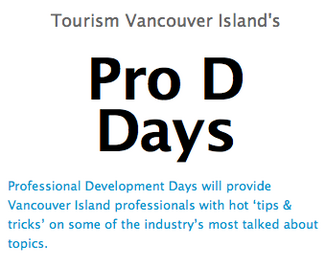By Anna Nehm and Liane O'Keefe

Attendees were invited to join the organization for a full day of networking, innovation, strategy and fun. Speakers included Dave Petryk, President & CEO of Tourism Vancouver Island who gave an industry lookout for 2014 and a regional tourism industry update; Jenn Houtby-Ferguson, Destination Development Officer at Tourism Nanaimo speaking to delivering the "WOW" to customers by understanding their purchasing decisions and needs; Denise Le Gal, Marketing Manager at Tourism Vancouver Island, and Kirsten Soder, General Manager of Tourism Tofino, both speaking about "Tapping into EQ" (Explorer Quotient); Dr. Nicole Vaugeois of Vancouver Island University speaking to the role of tourism in positioning Vancouver Island for long-term prosperity; and Baila Lazarus from Small Business BC & Phase 2 Coaching speaking about how a business can maximize its media content.
The event was very well attended, by surprisingly more Vancouver Island University students than professionals, who were all very curious and interested in connecting to the field and meeting professionals in the tourism industry. There were 1st and 4th year undergraduate students, students from the MA Sustainable Leisure Management program and as well former VIU students who are now working in the field and are employed at Tourism Nanaimo and Tourism Vancouver Island for instance.
After a welcome from Tofino Mayor, Josie Osborne, Dave Petryk (Tourism Vancouver Island) began with insight into and an update on the biggest developments, challenges and trends facing the tourism industry on Vancouver Island. Jenn Houtby-Ferguson (Tourism Nanaimo) followed and spoke about the importance of the customer experience in the tourism industry. It is crucial for companies to identify their role in the customer's experience and to learn how one can make an excellent impression on its customer that makes the customer want to return. Businesses on Vancouver Island simply have to work together as a team in order to attract visitors and to retain visitation. If a customer comes to visit a specific place on Vancouver Island, all the other cities on the island will benefit from it as well. Examples of companies that are delivering a "WOW" experience to its customers were given, including Disney Parks & Resorts and WestJet, who are both working together on delivering an excellent experience to customers. These two companies collaborated to design an aircraft, which is known as the "MagicPlane". The idea was to make the plane ride to Disney Parks & Resorts a part of the customer's experience (http://blog.westjet.com/introducing-westjet-magic-plane-special-livery/).
Denise Le Gal (Tourism Vancouver Island) and Kirsten Soder (Tourism Tofino) introduced the "Explorer Quotient" (EQ). EQ is an innovative market segmentation tool invented by the Canadian Tourism Commission. This tool looks is used to analyse psychographics and identifies who your travellers are, what appeals to them and how to communicate with them. By identifying what EQ type a customer belongs to, one can match his products and marketing strategies to this EQ type in order to attract customers and to suit the customers' needs and wants (http://en-corporate.canada.travel/resources-industry/explorer-quotient). Kirsten Soder talked specifically about how Tourism Tofino has modified its business practices and marketing strategies based on the EQ model, such as simplifying the website of Tourism Tofino and matching the pictures that are used on the website to the interests of the visitors.
Dr. Nicole Vaugeois of Vancouver Island University spoke about the role of tourism in positioning Vancouver Island for long-term prosperity. Dr. Vaugeois explained how Amenity-Based Rural Development (ABRD) can be used to revitalize a community by promoting the natural and cultural amenities within a region. By doing so, a region will attract new people, ideas and investment to the area. ABRD is closely connected to tourism. Visitors or tourists often return to a region if they enjoyed their stay and ideally become a resident or even an investor. Therefore, destination managers need to identify who their desired residents of tomorrow are in order to attract them to a destination. Tourism is the front door to most economic development efforts, which is often not fully recognized by stakeholders. Tourism is seen as a tool for exposure and if it is managed correctly, it can be very beneficial for a community. Many people often assume that tourism necessarily means growth and destruction, but tourism can help to achieve resilience and sustainability in a region as well.
Baila Lazarus (Phase2Coaching & Small Business BC) ended the afternoon with a talk about how companies can maximize their media in order to get more attention, to increase credibility and exposure. Useful tips were given that help one to make email newsletters more efficient and to maximize media content.
Overall, participating in the Tourism Pro-D Days was a great experience. It was very inspiring to meet tourism professionals, to have a chat and to exchange business cards. Participating in a Tourism Pro-D Day is a great opportunity to get an insight into the tourism industry. As students, it is important to get out of the classroom and attend these events in order to better understand the industry, get connected to the field and to begin to network.
References
Canadian Tourism Commission. (2010-2014). Explorer Quotient. Retrieved April 02, 2014, from http://en-corporate.canada.travel/resources- industry/explorer-quotient
Tourism Vancouver Island. (2014). Workshops. Retrieved April 02, 2014, from http://www.tvitour.ca/workshops2014/

